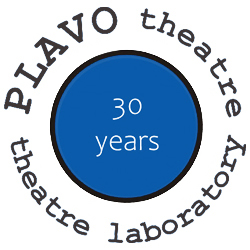 or The Project of Human Spirit Transition
or The Project of Human Spirit Transition
Directing: Nenad Colic
Assistant director: Ilija Ludvig
With: Ioana Cristtescu, Oana Tudor Sandra, Daniela Eugenia Voicu, Antoeneta Zaharia
Text: A. Artaud “Theatre and Its Double”, “The Theatre of Cruelty”, I. Ludvig and actors’ personal texts
Music arrangement: Nenad Colic and Ilija Ludvig
Translators into Romanian: Roxana Crisan, Diana Doni
Executive producers: Roxana Crisan (Fundatia Culturala Contemporania), Leonid Doni (CIAC)
Technical assistant: Mihai Pacurar
Premiere: 22.03.2001. Bucharest, Centre for Contemporary Arts
Co-production: PLAVO theatre & Centre for Contemporary Arts, Bucharest
Supported by: Fundatiei META, Just Sons Studio, Tetrului Odeon, Tetrului Bulandra, Studioului de Teatru Casandra, Teatrul Studetesc Podul
During February and March 2001, Plavo Theatre realized a co-operation with the Centre for Contemporary Arts in Bucharest, Romania. The director of Plavo Theatre Nenad Colic and actor and assistant Ilija Ludvig realized together with four Romanian actresses the performance ‘Let’s Dance Tutuguri or The Project of Human Spirit Transition’. This project represents the exchange of experiences between people coming from countries in transition, and their personal seeing of that process.
‘The road to life’ is only a micro-project which is a part of this macro-project, and which is called ‘transition’. Before the world’s macro-project, the idea of transition was exclusively related to the area of economy. But is economic transition possible without having some kind of ‘human’ transition, which precedes it? Probably it is, but were we ready for it? Does that leave any consequences? Probably it does. What kind of consequences are they? We don’t know that yet. Or we do? Could they be seen already today?
To make it completely clear, the author of these lines, as an individual and a citizen, feels himself a sufferer of the dictatorial regime which lasted for ten years on the territory of today’s Yugoslavia, so he has a positive attitude towards the modern world’s macro-project like this. But being an artist and a director of a theatre that has an anthropological and experimental discourse in its work, I am free to reflect on something that I am a part of. This should be one of the basic democratic principles. Or will we slave to the taboos for ever?’
Nenad Colic, 2001
